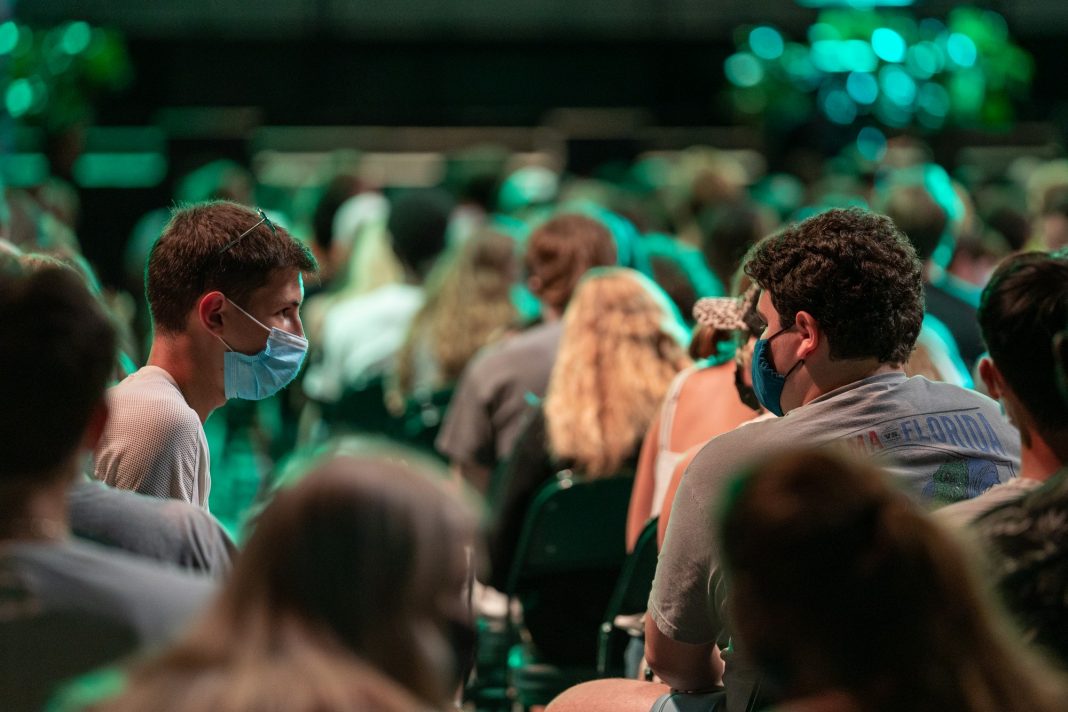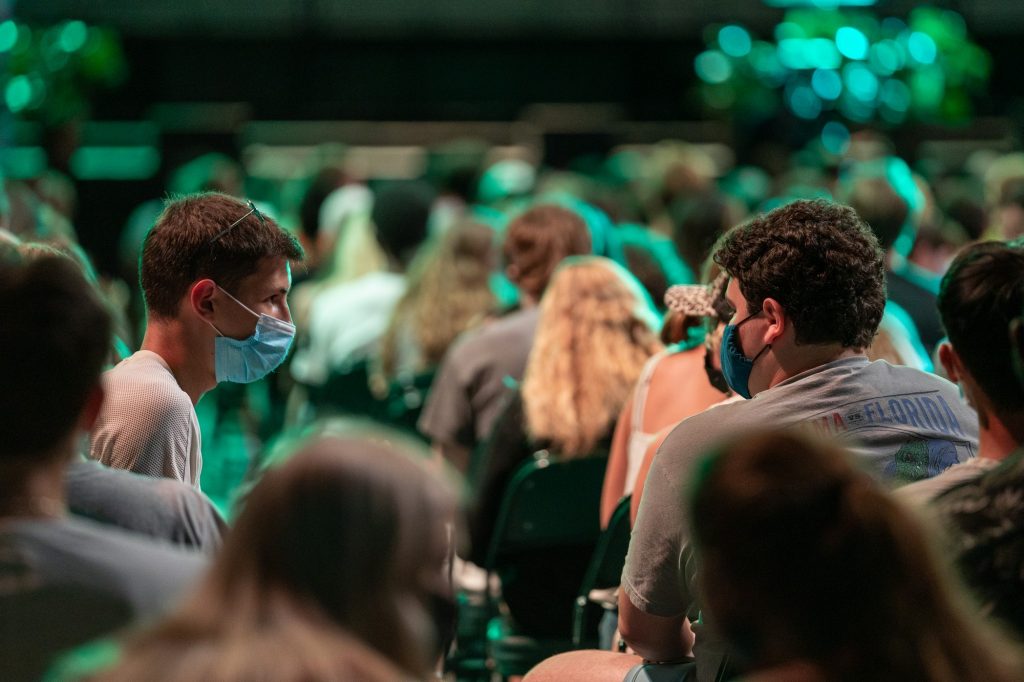

Last year, the University of Miami was one of the mere 30 percent of universities and colleges nationwide to open their doors for in-person instruction. Now, UM has welcomed the largest freshman class in the university’s history as administrators pin their hopes for decreased COVID regulations on widespread vaccinations.
This will be the most densely populated year for residential students since the late ‘80s, with 5,250 students living on campus. These record numbers come amid peak infection rates in South Florida and the spread of the more contagious delta variant of the coronavirus.
As of Monday, Aug. 23, there are 52 combined active isolations due to positive COVID test results among both residential and non-residential students, according to the university’s COVID dashboard. The dashboard, updated twice daily during the semester, shows 110 active cases among students and employees on the first day of the fall semester.
“Last year I thought that it would have been the most challenging time, but if anything I think we’ll have more challenges this fall than what we could have anticipated,” said Student Government President Landon Coles. “We have 3,000 more students on campus this year than we did last year, we have fewer policies in place as a result of the city of Miami lifting the curfew and many mask mandates are being dropped as a result of the city of Miami being wide open. Now we’re all back and that in and of itself is going to compound the challenges.”
In conjunction with an indoor mask mandate, which is not enforced throughout Miami-Dade county, the university has made its first line of defense clear: Get vaccinated.
During a town hall on Aug. 11, university administrators spoke on both what’s to come this fall and the importance of vaccination, particularly among students.
“We have not only a year of experience under our belt but now we have the most powerful tool in our arsenal, which are the vaccines,” President Julio Frenk said. “Vaccines are the tool that will end the pandemic and we will do everything we can to encourage students to get vaccinated.”
Under Florida law, no educational institution may block nor compromise a student’s access to education on the basis of their vaccination status. Because of this, the university cannot mandate that students be vaccinated to return to campus. However, the university is within its right to mandate that faculty and staff are vaccinated prior to their return this fall.
“Our choices are very much constrained by legislative reality but we are strongly encouraging our students to get vaccinated,” said Erin Kobetz, public health expert and vice provost of research and scholarship at UM.
Kobetz, who serves on the university’s COVID-19 response team, said in an interview with the Miami Hurricane that the spread of the delta variant adds another level of complications for managing the virus on campus.
“The delta variant is so unbelievably contagious and it accounts for over 90 percent of all of our new cases across our university health system,” Kobetz said. “Optimally, vaccination happens in these first couple of weeks of school when the delta variant is so extraordinarily prevalent and we’re sort of at the peak of this newest surge of infection. This is when vaccination matters most.”
As the delta variant rages across South Florida and infection rates continue to climb, vaccination rates have slowed. Dr. Roy Weiss, chair of the department of medicine at the Miller School of Medicine and chief officer for COVID-19, explained during the town hall how variants are produced and why vaccination is critical.
Variants occur as a result of genetic mutation when the coronavirus is spread from person to person. In the case of the delta variant, these mutations lead to worse symptoms and enhanced transmissibility. When the coronavirus finds a group of individuals who are not vaccinated against the virus, it gives it more opportunity to mutate, which can yield yet another variant. Weiss says that it is essential that people get vaccinated to both protect themselves against the coronavirus and the delta variant as well as prevent the potential of further mutation.
“We’re following the science. The science is very clear,” Frenk said. “We know it is a highly effective and extremely safe vaccine so we are going to require it where we can.”
The university partnered with Walgreens to deliver COVID-19 vaccines from Aug. 17 to Aug. 20 and Aug. 23 through Aug. 26, from 1:00 p.m. to 5 p.m. in the Storm Surge Room at the Hurricane Food Court. Although unvaccinated students are in the minority, reaching them is the key to returning to normality, student leaders say.
“That is the number one thing, encouraging those who we have left to get vaccinated,” Coles said. “Although we do not have official numbers, we do know that a majority of individuals, students, have been vaccinated.”
The university’s COVID-19 dashboard, initially created to track infections on campus, will soon be updated with the number of students, staff and faculty fully vaccinated, Kobetz said.
The university is incentivizing students to get vaccinated through a raffle system in which vaccinated students have the opportunity to win prizes ranging from hotel room getaways to cash prizes.
“State leadership, which is limiting local municipalities from having mask and vaccine mandates, is really tying the hands of those local institutions,” Coles said. “Instead of sitting around and complaining I think it’s better to think around those challenges, so I think the vaccine incentive program is a great way to think around these challenges in the Florida landscape.”
Although UM is making every effort to encourage students to get vaccinated, the grim reality is that infection will continue on campus and quarantine will still very much be a norm. Kobetz says that the university has adapted its quarantine policy in accordance with both CDC guidelines and in recognition of the danger posed by the delta variant.
There are separate quarantine procedures for those who are vaccinated and unvaccinated. If vaccinated individuals are is exposed they will be contacted by the UTrace team and are tested on both day one and five after their exposure. Those students should also to pay closer attention to mask wearing and sanitization.
If unvaccinated individuals are exposed, they are contacted by the UTrace team and quarantined for a week. They will test on day five and if the results are negative they will remain in quarantine for the full seven days. If they are a residential student and need space to quarantine, the university will provide an off-campus hotel room to stay while quarantined.
UM had previously announced that the cost of off-campus quarantines would have to be paid for by the student. However, the university recently announced it would pay for the cost of housing during quarantine and provide students with a debit card for food.
“Given that we’re seeing new infections in some of our vaccinated individuals, we felt like it was overly punitive therefore we changed our stance,” Kobetz said.
Classes will be recorded for students who are unable to attend lectures during quarantine.
Ultimately, the university’s ability to contain the virus while still offering in-person instruction is limited.
“I think it’s unrealistic for us to expect that UM as an institution can control and dictate the behaviors of every individual who walks this campus,” Coles said. “We as students have to have peer leadership where we are encouraging one another and holding our friends to account when engaging in activities out of campus’ view.”
The UM community had hoped this year would more closely resemble years prior to the pandemic. Even in light of the current circumstances surrounding the coronavirus, administrators and student leaders continue their tireless efforts to provide a safe and engaging year.
“I really thought last spring, not that it was going to be over, but that it was the beginning of the end,” Kobetz said. “I do believe it’s possible for us to get there, but more people are going to have to get vaccinated, more people are going to have to wear masks indoors regardless of vaccination status, and these are not political decisions, they are informed by the best that public health has to offer. And so, I continue to cling to my training as a public health expert and to believe in the potential of science and each other. Together we are better and stronger and we shall overcome, right?”






